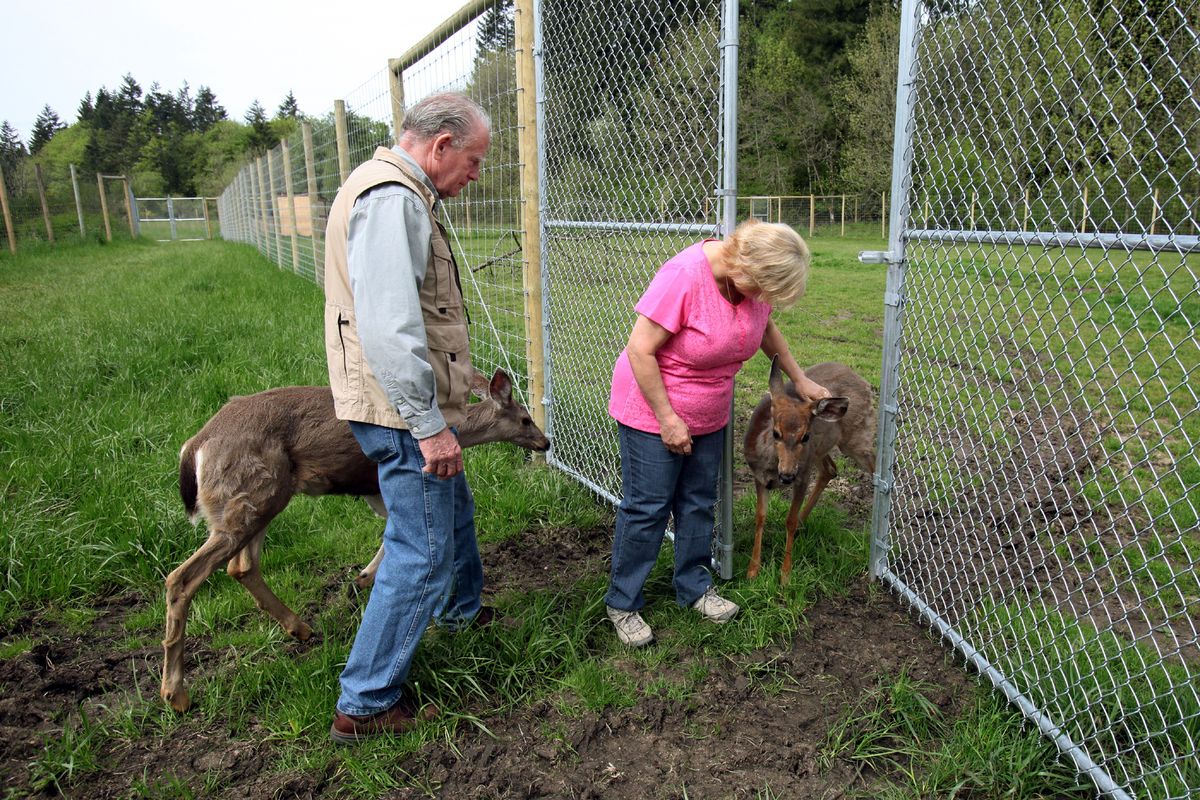Baby animals wrongly saved, left at shelters

OLYMPIA – When finding young animals alone in the wild, go against instinct.
They can be cute, cuddly and seemingly defenseless, but people often needlessly rescue animals that likely were not orphaned to begin with.
“It’s a perennial issue. Ninety-nine times out of 100, wild animals should not be taken out of the wild,” said Madonna Luers, public information officer for the state Department of Fish and Wildlife.
The department doesn’t have the funding to care for abandoned and injured animals turned in, forcing it to rely heavily on nonprofit wildlife rescues statewide, Luers said.
For Heaven’s Sake near Rochester, Wash., one of three licensed rescues in Thurston County, took in about 300 animals last year, including 35 fawns.
White-tailed deer fawns and seal pups are the most common mistakenly rescued animals.
Both are born without scent, meaning they can’t be smelled by predators, Luers said. At times, they’re left by their mothers as protection.
The list goes on to include newborn squirrels, rabbits, raccoons, opossums and birds.
The county’s three rescues are in Tenino, Rochester and Yelm, which has a veterinary clinic.
Each is bombarded by baby animals each year.
“One year we even pitched it as an invasion of the baby snatchers,” Luers said. “People are well-intentioned, but it’s not the right thing to do. The best bet is to leave them alone.”
David and Claudia Supensky have been in the business of rehabilitating animals for years.
After starting in Texas, the retired couple moved to Washington. They acquired a license from the state two years ago and opened the nonprofit rescue For Heaven’s Sake.
As of Tuesday, the couple had 115 mouths to feed – and counting.
Most are squirrels, rabbits, birds and opossums. Claudia Supensky said the fawns won’t start showing up until later this month.
“Unfortunately, some come to us because they were basically taken away from where they should be, and others come to us because mom has been killed or injured,” she said.
The Supenskys rely heavily on 15 regular volunteers, as well as a limited number of donations and grants.
Most funding comes from their own pockets.
“We’ve struggled because we are putting our own bucks into it, but we’re not sorry about that; we are glad to be doing it,” Supensky said.
The nonprofit is licensed to care for small mammals and nonmigratory birds. It’s in the process of getting a migratory bird permit from the federal government.
The rescued animals are kept on the Supenskys’ property, which includes a three-acre fenced area for orphaned fawns.
Fawns use the area to learn how to forage before being released after hunting season.
“The sad thing is deer fawns are hard to truly rehabilitate,” Luers said. “Some critters are harder than others; they imprint on people, which is not a good thing.”
Two does that became tame have become permanent residents of the rescue.
Willow and Demi, both yearlings, both became too trusting of humans and otherwise would have been euthanized.
The state brought them to For Heaven’s Sake so that other fawns can learn from deer and don’t become too comfortable around humans.
While the Supenskys have kept busy, things haven’t quite hit their peak for other rescues in the area.
At her Tenino home, Carol Ekker takes in small mammals that are either abandoned or injured.
It has been a slow season; she has cared for 14 opossums and three squirrels so far.
She takes in about 100 each year.
“I always get baby opossums from people who already found the mama dead,” Ekker said. “They dig them out of the pouch and bring them to me. I’m really appreciative to someone who would take the time to pick these little guys up.”
Ekker heard that the Supenskys had more than 100 animals and planned on calling to lend a hand.
“You burn out in a heartbeat,” Ekker said.